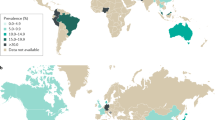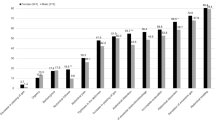Abstract
Background
Irritable bowel syndrome (IBS) is common with prevalence reported between 10 and 20 %. IBS clusters in families but it is unknown whether this is explained by a common environment, genes, or both. If early-life factors are important, IBS might be expected to demonstrate a birth cohort phenomenon.
Aim
To investigate whether there is a birth cohort phenomenon for subjects with IBS.
Methods
Validated questionnaires were sent to a random sample of Olmsted County, Minnesota, residents who recorded gastrointestinal symptoms; IBS diagnosis was based on the modified Rome criteria. Birth cohorts were chosen a priori based on historical national trends in birth weights using 10-year increments. Logistic regression was used to develop odds ratios to assess the association of IBS with calendar period, birth cohort, age, gender, and somatic symptom score.
Results
A total of 4,893 surveys were completed with an overall survey response rate of 58 %. The survey responders were between 25 and 94 years of age and 53 % were female. The overall prevalence of IBS was 16.2 % (95 % CI 15.3–17.4). The univariate association of IBS with birth cohort was significant (p < 0.001) as was the association adjusted for age and gender. The prevalence of IBS was highest for the birth cohort 1963–1972 with an odds ratio of 2.6 (95 % CI 0.97–7.0, p = 0.058).
Conclusions
Population-based data support a possible birth cohort phenomenon in IBS. If correct, early-life risk factors likely play a key role in the development of IBS.

Similar content being viewed by others
References
Halder SL, Locke GR 3rd, Schleck CD, et al. Natural history of functional gastrointestinal disorders: a 12-year longitudinal population-based study. Gastroenterology. 2007;133:799–807.
Switz DM. What the gastroenterologist does all day. A survey of a state society’s practice. Gastroenterology. 1976;70:1048–1050.
Mitchell CM, Drossman DA. Survey of the age membership relating to patients with functional gastrointestinal disorders. Gastroenterology. 1987;92:1282–1284.
Chitkara DK, van Tilburg MA, Blois-Martin N, Whitehead WE. Early life risk factors that contribute to irritable bowel syndrome in adults: a systematic review. Am J Gastroenterol. 2008;103:765–774.
Talley NJ, Fett SL, Zinsmeister AR. Self-reported abuse and gastrointestinal disease in outpatients: association with irritable bowel-type symptoms. Am J Gastroenterol. 1995;90:366–371.
Chang JY, Locke GR 3rd, McNally MA, et al. Impact of functional gastrointestinal disorders on survival in the community. Am J Gastroenterol. 2010;105:822–832.
Howell S, Poulton R, Talley NJ. The natural history of childhood abdominal pain and its association with adult irritable bowel syndrome: birth-cohort study. Am J Gastroenterol. 2005;100:2071–2078.
Anand KJ, Runeson B, Jacobson B. Gastric suction at birth associated with long-term risk for functional intestinal disorders in later life. J Pediatr. 2004;144:449–454.
Bengtson MB, Ronning T, Vatn MH, Harris JR. Irritable bowel syndrome in twins: genes and environment. Gut. 2006;55:1754–1759.
Sonnenberg A. Birth-cohort patterns of mortality from ulcerative colitis and peptic ulcer. Ann Epidemiol. 2008;18:813–819.
Huang GH, Klein R, Klein BE, Tomany SC. Birth cohort effect on prevalence of age-related maculopathy in the beaver dam eye study. Am J Epidemiol. 2003;157:721–729.
Sonnenberg A. Causes underlying the birth-cohort phenomenon of peptic ulcer: analysis of mortality data 1911–2000, England and Wales. Int J Epidemiol. 2006;35:1090–1097.
Ehlin AG, Montgomery SM, Ekbom A, Pounder RE, Wakefield AJ. Prevalence of gastrointestinal diseases in two british national birth cohorts. Gut. 2003;52:1117–1121.
Melton LJ 3rd. History of the rochester epidemiology project. Mayo Clin Proc. 1996;71:266–274.
Talley NJ, Zinsmeister AR, Melton LJ 3rd. Irritable bowel syndrome in a community: symptom subgroups, risk factors, and health care utilization. Am J Epidemiol. 1995;142:76–83.
Talley NJ, Zinsmeister AR, Van Dyke C, Melton LJ 3rd. Epidemiology of colonic symptoms and the irritable bowel syndrome. Gastroenterology. 1991;101:927–934.
Talley NJ, Zinsmeister AR, Schleck CD, Melton LJ 3rd. Dyspepsia and dyspepsia subgroups: a population-based study. Gastroenterology. 1992;102:1259–1268.
Talley NJ, O’Keefe EA, Zinsmeister AR, Melton LJ 3rd. Prevalence of gastrointestinal symptoms in the elderly: a population-based study. Gastroenterology. 1992;102:895–901.
Locke GR 3rd, Talley NJ, Fett SL, Zinsmeister AR, Melton LJ 3rd. Prevalence and clinical spectrum of gastroesophageal reflux: a population-based study in olmsted county, minnesota. Gastroenterology. 1997;112:1448–1456.
Locke GR 3rd, Zinsmeister AR, Talley NJ, Fett SL, Melton LJ. Risk factors for irritable bowel syndrome: role of analgesics and food sensitivities. Am J Gastroenterol. 2000;95:157–165.
Talley NJ, Fett SL, Zinsmeister AR, Melton LJ 3rd. Gastrointestinal tract symptoms and self-reported abuse: a population-based study. Gastroenterology. 1994;107:1040–1049.
Talley NJ, Phillips SF, Melton J 3rd, Wiltgen C, Zinsmeister AR. A patient questionnaire to identify bowel disease. Ann Intern Med. 1989;111:671–674.
Talley NJ, Phillips SF, Wiltgen CM, Zinsmeister AR, Melton LJ 3rd. Assessment of functional gastrointestinal disease: the bowel disease questionnaire. Mayo Clin Proc. 1990;65:1456–1479.
Attanasio V, Andrasik F, Blanchard EB, Arena JG. Psychometric properties of the sunya revision of the psychosomatic symptom checklist. J Behav Med. 1984;7:247–257.
O’Keefe EA, Talley NJ, Tangalos EG, Zinsmeister AR. A bowel symptom questionnaire for the elderly. J Gerontol. 1992;47:M116–M121.
Locke GR, Talley NJ, Weaver AL, Zinsmeister AR. A new questionnaire for gastroesophageal reflux disease. Mayo Clin Proc. 1994;69:539–547.
Reilly WT, Talley NJ, Pemberton JH, Zinsmeister AR. Validation of a questionnaire to assess fecal incontinence and associated risk factors: fecal incontinence questionnaire. Dis Colon Rectum. 2000;43:146–153 (discussion 153–144).
Locke GR 3rd, Zinsmeister AR, Fett SL, Melton LJ 3rd, Talley NJ. Overlap of gastrointestinal symptom complexes in a US community. Neurogastroenterol Motil. 2005;17:29–34.
Robertson C, Boyle P. Age, period and cohort models: the use of individual records. Stat Med. 1986;5:527–538.
Brosco JP, Sanders LM, Guez G, Lantos JD. Historical trends in low birth weight. Arch Pediatr Adolesc Med. 2010;164:99–100.
Finkelhor D, Turner H, Ormrod R, Hamby SL. Trends in childhood violence and abuse exposure: evidence from 2 national surveys. Arch Pediatr Adolesc Med. 2010;164:238–242.
Berseth CL. Gestational evolution of small intestine motility in preterm and term infants. J Pediatr. 1989;115:646–651.
Child Trends. Low and very low birth weight infants. 2012. http://www.childtrendsdatabank.org/?q=node/67.
Thum C, Cookson AL, Otter DE, et al. Can nutritional modulation of maternal intestinal microbiota influence the development of the infant gastrointestinal tract? J Nutr. 2012;142:1921–1928.
Lee BJ, Bak YT. Irritable bowel syndrome, gut microbiota and probiotics. J Neurogastroenterol Motil. 2011;17:252–266.
Ryan AS, Wenjun Z, Acosta A. Breastfeeding continues to increase into the new millennium. Pediatrics. 2002;110:1103–1109.
Maia C, Brandao R, Roncalli A, Maranhao H. Length of stay in a neonatal intensive care unit and its association with low rates of exclusive breastfeeding in very low birth weight infants. J Matern Fetal Neonatal Med. 2011;24:774–777.
Choung R, Locke GR, Schleck C, et al. A low response rate does not necessarily indicate non-response bias in gastroenterology survey research: a population-based study. J Public Health. 2013;21:87–95.
Acknowledgments
We would like to thank Lori Anderson for helping compile and submit this manuscript.
Conflict of interest
Dr. Talley and Mayo Clinic have licensed the Bowel Disease Questionnaire.
Author information
Authors and Affiliations
Corresponding author
Rights and permissions
About this article
Cite this article
Brummond, N.R., Locke, G.R., Choung, R.S. et al. Effects of Birth Cohorts on the Irritable Bowel Syndrome Support Early-Life Risk Factors. Dig Dis Sci 60, 2112–2118 (2015). https://doi.org/10.1007/s10620-015-3565-4
Received:
Accepted:
Published:
Issue Date:
DOI: https://doi.org/10.1007/s10620-015-3565-4




